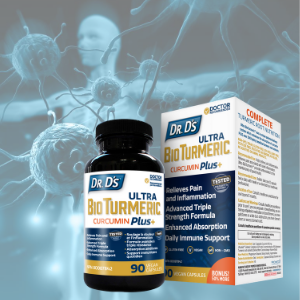
Turmeric: The Undercover Immune Booster
Share
I think it’s fair to state that turmeric is recognized by the public as a spice that is “good for you.” It has become particularly famous for its powerful anti-inflammatory properties, but what most people do not realize is that turmeric actually provides excellent immune support as well.
Allow me to speak for a moment directly about turmeric so that I can better explain its positive effects on the immune system. Turmeric is very well known for “curcumin.” Turmeric and curcumin are often used interchangeably and are a source of common confusion. Turmeric is an ancient spice that comes from the Curcuma longa plant. Curcumin is one of the most important nutrients found in turmeric as it contains the greatest amount of medicinal properties. Curcumin is therefore a very special component of the turmeric root but is indeed not the same thing as turmeric.
Curcumin has been shown to improve antibody responses in the body. An antibody is a special protein that binds to any intruder which signals the immune system to respond. The reported benefits of curcumin (and therefore turmeric) on disease may be partly due to this special ability to modulate the immune system.
It is important to note that curcumin (although very important, yes) only comprises 3 percent of the entire turmeric root! There are over 200 other disease-fighting compounds of the root (which is why it is important to take a full spectrum turmeric supplement). Other turmeric root nutrients such as α-turmerone, ar-turmerone and polar extracts have also been shown to contribute to immune response. (You can learn more about full spectrum turmeric supplementation on our blog entitled Dr. D’s Ultra Bio Turmeric: Whole Root Nutrition).
Curcumin, first and foremost, is a powerful antioxidant. Antioxidants are substances that protect our cells from something called free radicals. Free radicals are molecules that are produced when you are exposed to harmful agents such as tobacco smoke, radiation, pollution, etc., and are therefore associated with many diseases. Free radicals are dealt with by our immune system, but not always perfectly. Furthermore, studies have shown that curcumin is effective in the treatment of toxicity and oxidative stress. Oxidative stress is a contributor to the development of neurodegenerative diseases, and therefore recent studies are looking into how to reduce oxidation therapeutically with curcumin…and even to prevent the disease in the first place! The fact that curcumin is an antioxidant inherently makes it an immune system supporter because it helps to decrease the body’s exposure to harmful agents to begin with.
Turmeric is also an immunomodulator in the sense that it modifies or enhances the appropriate response of the immune system. Studies have shown that curcumin and the other turmeric root nutrients control the growth and cellular response of different immune cells such as dendritic cells, natural killer cells, macrophages, and lymphocytes. These are all key players of our immune system so we need them to grow and respond efficiently in order for our immune system to be effective. Moreover, α-turmerone has anti-proliferative effects, meaning that it actually decreases growth of (harmful) cells.

Another way in which turmeric is an immune booster is through the modulation of both the proliferation and activation of T cells and B cells. There are many types of these special cells, but what is important to know is that they are extremely important cells of our adaptive immune system (this is the subset of our immune system which gives our defences “memory” in order to respond more quickly to a subsequent attack from a bacteria or virus.).
A fascinating fact about curcumin is that it can clearly stimulate an immune response, but it also has been shown to have immunosuppressive effects. Why would we want to suppress an immune response, you ask? Because like so much else in life, too much of a good thing can often lead to bad. There are many diseases that arise when the immune system mistakenly overreacts- this is the basis of autoimmune disease. Examples of autoimmune disease includes Multiple Sclerosis, Rheumatoid Arthritis and Crohn’s Disease. Essentially, turmeric seems to possess a natural genius; knowing when and how to stimulate the immune system when needed, yet suppressing it when it is being overdriven.
So, yes, underneath all of the wonderful well-known benefits of turmeric is a powerful immune supporter. A daily dose of turmeric is sure to considerably give your immune system a boost!
Source:
Aurea Labs. India. Effects of curcumin on immune cells. 2020.
The Power of Turmeric: A Healing and Preventative Guide, Dr. Fabio Di Stefano, Publisher Production Solutions, 2018